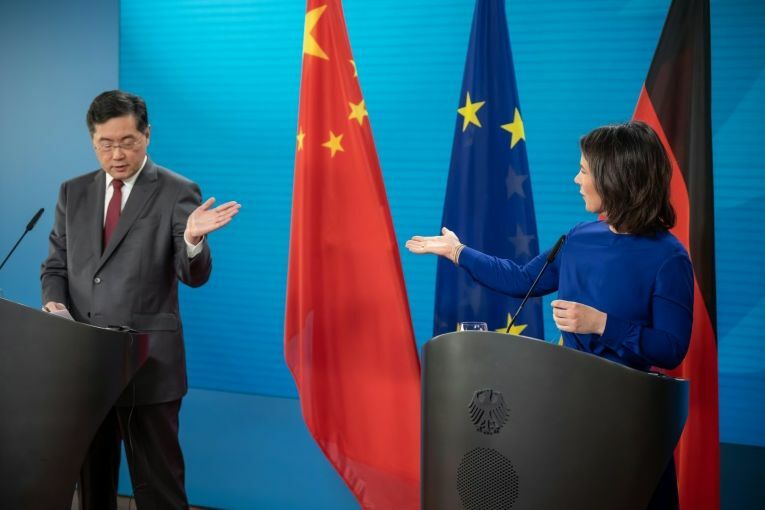China and Germany tensions worsen over Ukraine sanctions and neutrality stance

China-Germany tensions escalated yesterday as the two nations exchanged sharp words over the Ukraine crisis. with Beijing warning the EU not to sanction Chinese firms while Berlin argued that “neutrality” in the conflict meant siding with Russia.
During their second meeting in a month, Chinese Foreign Minister Qin Gang and German Foreign Minister Annalena Baerbock clashed repeatedly over the responsibilities of major powers on the international stage.
Qin cautioned the European Union against imposing penalties on Chinese companies due to their engagement with Russia, stating that China would take action to protect their interests.
Concerning possible restrictions aimed at eight Chinese firms that have been discussed within the EU, Qin warned that if punitive measures were implemented, “China will also take the necessary response to firmly protect the legitimate interests of Chinese companies”.
Qin emphasized that Chinese and Russian businesses enjoy “normal exchanges and cooperation” that “should not be affected”. The Chinese Foreign Minister also noted that China was “firmly against” other nations imposing their regulations or taking unilateral action against it. Qin is currently on a European tour that includes stops in France and Norway.
EU ambassadors are set to meet today to initiate discussions on the 11th round of sanctions surrounding Russia’s war on Ukraine.
As part of these sanctions, the EU’s executive has proposed ceasing exports of sensitive technologies to eight Chinese firms due to suspicions that they were providing them to Russia, according to an AFP document. The EU aims to address the re-exportation of sensitive technology—such as microchips—through third countries to Russia, which can then be used on the battlefield.
Baerbock refrained from mentioning particular measures that might be taken against China. However, she asserted that the EU wanted to make sure that existing sanctions against Russia are not “being subverted in a roundabout way” via third countries.
“We expect all countries — we also expect from China — to use its influence on its companies to this end,” said Baerbock.
Qin insisted that China has consistently advocated for “peaceful dialogue” as a resolution to the war in Ukraine, and claimed that it was not interested in “pouring oil on the fire” with excessive intervention.
China plans to send a special envoy to Ukraine to address the issue, added Qin, urging Germany to do more in promoting a ceasefire and peace negotiations.
Baerbock, however, urged Beijing to clearly oppose Russia, stressing that failure to support Ukraine meant siding with Moscow. “Neutrality means taking the side of the aggressor, and that is why our guiding principle is to make it clear that we are on the side of the victim,” she said.
Qin warned that Germany, as Europe’s leading economy, would face significant consequences if it attempted to “decouple” from China or distance itself economically due to political “differences”.
In a speech before the European Parliament, German Chancellor Olaf Scholz acknowledged that “rivalry and competition on the side of China have certainly increased”. He supported European Commission President Ursula von der Leyen’s call for “smart de-risking” of Europe from China rather than the more severe approach that the United States is advocating, reports Bangkok Post.
Although Beijing has attempted to position itself as a neutral party in Russia’s war on Ukraine, with President Xi Jinping holding his first call with Ukrainian President Volodymyr Zelensky since the invasion, the Chinese Ambassador to France’s recent comments questioning the sovereignty of ex-Soviet states has cast doubt on its purported neutrality. Additionally, a position paper from Beijing outlining a plan to resolve the conflict has been met with scepticism by both the United States and NATO.
Latest Thailand News
Follow The Thaiger on Google News:


























